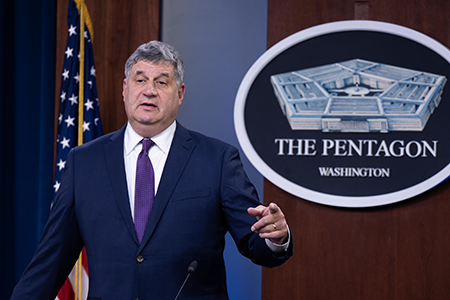“Right after I graduated, I interned with the Arms Control Association. It was terrific.”
Overbudget ICBM Program Survives Review
September 2024
By Xiaodon Liang
The United States will continue building a new intercontinental ballistic missile (ICBM) force despite escalating cost overruns, according to the Pentagon.

The acquisition program for the Sentinel ICBM, which involves the design and purchase of 659 missiles and the refurbishment and construction of support infrastructure, is now projected to cost $141 billion in 2020 dollars. That figure is 81 percent more than estimated when the Pentagon granted Milestone B approval in September 2020, at which point the program was authorized to enter the engineering and manufacturing development phase.
The decision to continue the program and the new cost estimate were announced in a July 8 press briefing by William LaPlante, the undersecretary of defense for acquisition and sustainment, after the Pentagon completed a statutorily mandated review triggered by cost projection increases first disclosed to Congress in January. (See ACT, March 2024.) The Defense Department has not released a public report on the six-month review.
The estimate does not take into account the W87-1 nuclear warhead for the ICBM, which the National Nuclear Security Administration believes will cost $15.9 billion.
LaPlante led the review process required by the Nunn-McCurdy Act, which contains fiscal discipline measures that are triggered when the cost increases of a major acquisition program cross certain thresholds. A breach is triggered by a 15 percent unit cost increase over the baseline, while a critical breach requires a rise of 25 percent over the baseline. In December, before the in-depth review, the Air Force found that running cost estimates indicated that the Sentinel program was in critical breach of the law.
The Pentagon has not released an updated estimate of the cost in current and future dollars, but application of the same adjustment as the one used in the last declassified Selected Acquisition Report on the Sentinel program from December 2023 would suggest an inflation-adjusted cost of $202 billion.
“I am deeply disappointed by the decision to continue this wasteful and unnecessary endeavor,” Rep. John Garamendi (D-Calif.) said in a July 9 press release. A leading congressional critic of the Sentinel program, Garamendi expressed regret that the review did not address “whether it is necessary to maintain the land-based leg of the nuclear triad at its current levels” and called on the Defense Department and the White House to revisit this question.
LaPlante certified that the ICBM program was essential to national security and that there are no alternatives. Under the Nunn-McCurdy Act, these certifications are required to continue a program that is in critical breach of cost thresholds. LaPlante confirmed during the July 8 briefing he had rescinded the program’s Milestone B approval and announced that he had requested that the Air Force develop a plan for restructuring the program. These steps are also mandated by the act.
LaPlante said the Pentagon’s Cost Assessment and Program Evaluation office had led a study of “four or five” alternatives to the Sentinel program, including extension of the service life of the existing Minuteman III ICBM until 2070, a road-mobile basing mode, and “hybrid options.” All major alternatives were rejected because they did not meet requirements or were more costly than the current plan.
Vipin Narang, the acting assistant secretary of defense for space policy, confirmed on July 19 that the review also considered adapting the Trident D5 submarine-launched ballistic missile for a ground-based role. He said that option was rejected because it did not produce any significant cost savings while creating a common point of failure across the sea- and land-based legs of the nuclear triad.
In March, Garamendi and Sen. Elizabeth Warren (D-Mass.) sent a letter to Kristyn Jones, acting undersecretary of the Air Force, urging her to ensure that the Nunn-McCurdy review would price out alternative plans to extend the service life of the Minuteman III to 2030, 2040, or 2050.
Although the Pentagon did not consider these options, the Air Force opted to reduce the complexity of ICBM launch facilities as a result of the review with the hope of saving time and money, LaPlante said. Without any adjustments, the expected cost of the original Sentinel plan had increased to $160 billion in 2020 dollars, 106 percent over the Milestone B baseline.
The program is now “several” years behind schedule, according to LaPlante. The Pentagon previously anticipated a two-year delay past the May 2029 target for initial deployment. (See ACT, May 2023.)
Officials blamed rising cost estimates on an immature understanding of the scope of work needed for the ground segment of the program when Milestone B approval was granted. Andrew Hunter, an Air Force senior acquisition executive, said at the July 8 press briefing that the ground segment, which includes not only launch facilities but also silos and communications infrastructure, accounted for “the vast majority” of the cost increase. Speaking July 20 in the United Kingdom, Hunter said, “I think there are elements of the ground infrastructure where there may be opportunities for competition,” Breaking Defense reported.
Northrop Grumman has been the lead contractor for the Sentinel program since September 2020, while Bechtel is the primary construction subcontractor.
